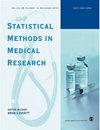临床试验中的非比例危害方法:系统回顾
IF 1.6
3区 医学
Q3 HEALTH CARE SCIENCES & SERVICES
引用次数: 0
摘要
对于时间到事件数据的分析,常用的方法如对数秩检验或 Cox 比例危险模型都是基于比例危险假设,而这一假设往往是值得商榷的。虽然针对非比例危险提出了多种参数和非参数方法,但对于最佳方法还没有达成共识。为了填补这一空白,我们进行了一次系统的文献检索,以确定适合非比例危险的统计方法和软件。我们的文献检索发现了 907 篇摘要,其中我们收录了 211 篇文章,大部分是方法论文章。综述文章和应用文章较少。这些文章讨论了效应测量、效应估计和回归方法、假设检验和样本量计算方法,这些方法通常是针对特定的非比例危害情况而设计的。我们使用统一的符号对现有方法进行了概述。此外,我们还从确定的文章中得出了一些指导意见。本文章由计算机程序翻译,如有差异,请以英文原文为准。
Methods for non-proportional hazards in clinical trials: A systematic review
For the analysis of time-to-event data, frequently used methods such as the log-rank test or the Cox proportional hazards model are based on the proportional hazards assumption, which is often debatable. Although a wide range of parametric and non-parametric methods for non-proportional hazards has been proposed, there is no consensus on the best approaches. To close this gap, we conducted a systematic literature search to identify statistical methods and software appropriate under non-proportional hazard. Our literature search identified 907 abstracts, out of which we included 211 articles, mostly methodological ones. Review articles and applications were less frequently identified. The articles discuss effect measures, effect estimation and regression approaches, hypothesis tests, and sample size calculation approaches, which are often tailored to specific non-proportional hazard situations. Using a unified notation, we provide an overview of methods available. Furthermore, we derive some guidance from the identified articles.
求助全文
通过发布文献求助,成功后即可免费获取论文全文。
去求助
来源期刊

Statistical Methods in Medical Research
医学-数学与计算生物学
CiteScore
4.10
自引率
4.30%
发文量
127
审稿时长
>12 weeks
期刊介绍:
Statistical Methods in Medical Research is a peer reviewed scholarly journal and is the leading vehicle for articles in all the main areas of medical statistics and an essential reference for all medical statisticians. This unique journal is devoted solely to statistics and medicine and aims to keep professionals abreast of the many powerful statistical techniques now available to the medical profession. This journal is a member of the Committee on Publication Ethics (COPE)
 求助内容:
求助内容: 应助结果提醒方式:
应助结果提醒方式:


